In our previous article on Strategy, we addressed the six point checklist you need before formulating business strategy. In this article, we'll talk about what to do when you have the necessary ingredients covered within those six postulates. Today, we'll be answering the ever-so-pertinent question - "How to formulate strategy."
More precisely... How to formulate business strategy...
How To Formulate Strategy
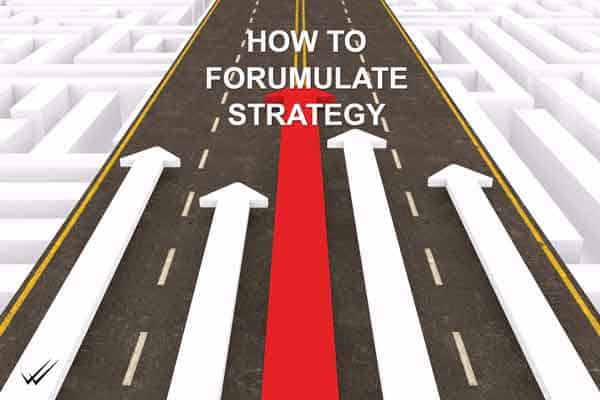
So you've gone through the six-point checklist and now you're ready to formulate your strategy. Without further ado, let's dive into the four cornerstones that you'll be working on...
- Unique Positioning
- Economics
- Media
- Breakeven Period
We'll get to the details shortly. But first, let's talk basics.
Essentially, every business' core function is to get clients and then keep clients, while staying profitable. That's all there is to it, no matter how you slice it. That is all a business is. Any business. Every business.
So when you talk about business strategy, you are essentially talking about a strategy to get clients, and then to keep them so that they keep transacting with you repeatedly.
Note: Transactions are not always of a financial nature. Someone filling out a webform, or taking a survey, or requesting a call back, or scheduling an appointment, or walking into a store, or upgrading to a higher level of service... all these are transactions. Even someone spending time reading your emails is transacting with you. Your mission, should you choose to accept it, is to maximize these transactions just as much as increasing the revenues and EBITDA's.
Alright, so let's start.
Cornerstone #1: Unique Positioning
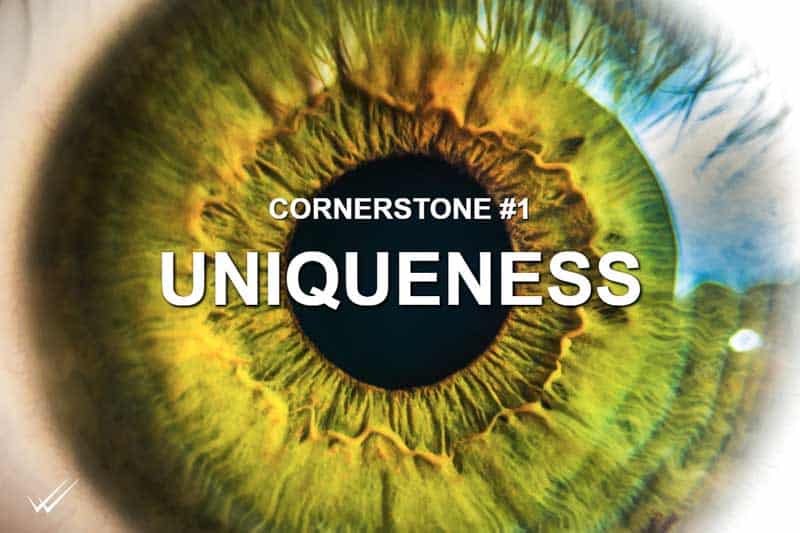
Broken down, every solid strategy answers four questions - who, what, why and how.

The first cornerstone answers the first three of these four questions. Which is why it is so important. It is also the one that pretty much every small business gets wrong. Not comprehending this cornerstone's importance is why businesses stay small.
So let's answer these questions...
WHO are you catering to?
Your market. Who are they? Of course we would all love it if we had a product like Google's Search Engine that caters to everybody on the planet. But chances are, your market is a subset of the entire population of the world.
You must know who they are.
WHAT are you offering them?
And WHY should they buy from you?
The second question is what are you offering to them. This question also entails a secondary, and a significantly more important question - Why should they accept your offer? Why should they pay you over your competitors? What are the benefits they receive by buying from you? And most importantly, are any of these benefits exclusively available from you?

The exclusivity factor is the most important one. You don't have to have a unique product in order to be able to offer exclusive benefits or advantages to your clients and customers.
What is the single greatest advantage you can have as a business owner or leader?
Well, that would depend upon what kind of economy you are operating in.
There are two kinds of economies in the world.
The first are the ones that are constrained by demand... like the US. In these economies, there are several suppliers in each market competing for marketshare, and customer has decision making power.
The other kind are the ones constrained by supply. Like India. There are audiences and segments of people willing to pay for products or services, but there is a dearth of suppliers... at least the ones that are readily available.
In supply-side-constrained economies, all you have got to do as a supplier or seller is to show up and not be too unreasonable... and BAM! The marketshare is yours to lose.
We are going to be focusing on the demand side constrained economies - which comprises of almost all the markets in Western countries. This is where you need a real business strategy.
There are buyers, yes. But there are far too many sellers catering to the buyers, and therefore you need a distinctive reason for the buyers to buy from you.
This distinctive reason is the first, and probably the most important cornerstone for your strategy.
Why should I buy from you instead of your competitor?
Of course you can answer that question in a myriad of ways...
But here's the sad part. Most business leaders think that the only rational answer to that question is, "because I'm cheaper. With me you'll spend less money."
The second most prevalent answer to that question is, "I'm right here. I'm convenient for you to get to."
Often the two go hand-in-hand.
And sadly, these are the two worst reasons you can offer your clients.
Because sooner or later, a competitor with deeper pockets will show up on your block, if they already haven't... and take your business from you.
Secondly, by making "cheap" and/or "convenient" your unique advantage, you're inviting the laziest and/or most price-conscious buyers to do business with you.
Thirdly, the low selling prices kill your ability to do cool marketing stuff - like sending out newsletters, or organizing events, or building elaborate advertising campaigns. This cool marketing stuff is what has the potential to make your business grow exponentially. But it does cost some money. By reducing your margins to single digits, you're killing your own ability to grow your business.
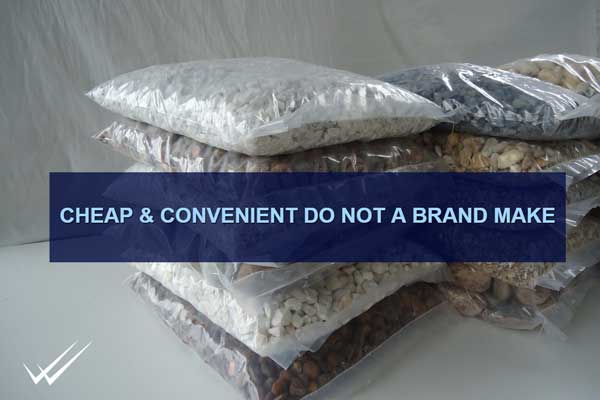
Fourthly, it'll take a heck of a lot of sales for you just to stay afloat and cover your fixed costs. It'll take a heck of a lot of sales to bring home the bacon.
Next, "cheap" and/or "convenient" is not the way to go if you want to hire motivated and passionate superstars to come and work for you. Be it a star salesperson, or super manager, or a dedicated executive... no one's particularly turned on by working for a business who's primary selling factor is "cheap" or "convenient."
So what else can you offer?
Fortunately, if you are creative enough... a LOT.
The first cornerstone of strategy is uniqueness. Consequently, your first order of business is to figure out what your unique offer is. What your distinctive characteristic is.
And while offering a unique way of solving problems sounds like something only technologically advanced, or capitally gifted companies can do... the truth is that you can become very unique rather easily, if you are willing to innovate just a little.
So without further ado, I am going to give you...

The Six Universal Methods of Making A Unique Offer
- Target A Sub Market
- Target A Blue Ocean
- Offer An Insurmountable Guarantee
- Service & Warranty
- Exceptional Product Quality
- Payment Options
How to Target A Sub Market

Every market splinters into sub markets. Sub markets then grow and consolidate. These submarkets then get their own major players. Market leaders dominate, and every one else is left scrambling.
And the process repeats itself again.
Sub markets splinter into sub-sub-markets.
If your market already has established market leaders with dominating marketshares... don't compete. Just don't compete. It's not a strategic move at all to compete with someone who's already sitting on the top of the heap. With someone who has a multi-million, and in some case billion dollar marketing budget.
You just don't have the leverage to compete with them.
When you sit down and think about how to formulate strategy, it is imperative to think about being able to outdo whoever it is you will be competing with. And not just with money... but on every aspect you can think about.
Let's take an example.
If I went ahead and acquired a manufacturer of some kind of sports gear... say shoes... It would be a big mistake on my part to compete with Adidas, Reebok and Nike.
I don't have their budget. I don't have their recall. I don't have their range. And I don't have the ability to outdo them on almost any aspect.
So what I'd do is target a submarket. Maybe runners. Maybe tennis players. Maybe badminton players. Maybe basketball players. Maybe some other submarket. I'd pick one and run with it.

So if you're a basketball player... would you rather buy Adidas gear? Or would you prefer to buy from a company that specializes in your sport?
Every market splinters naturally eventually. Just be the force that drives this process, and you are already well on your way.
Another example... Don't be a photographer. Don't even be a wedding photographer. There are far too many of those, and there's not enough demand to keep them all well fed.
Joe Buissink knows and understands this. Which is why he became a celebrity wedding photographer. And you can bet he's getting paid very well.
How to Target A Blue Ocean

If splintering an established market is not an option (it almost always is but exceptions exist)... perhaps you would want to target a blue ocean.
A blue ocean is a corresponding market in another geography, or demography that is highly un-catered to.
In other words, you take your company from a demand-constrained economy, and move it to a supply-constrained economy.
So if you are trying to compete with Victoria's Secret, don't compete in the United States... go to India.

While it is true that India doesn't have that many wealthy buyers... it also stands to reason that of the 1.25 Billion people living in India, 12.5 Million fall within the top 1% bracket. And these people have more money than they have avenues to spend it at.
So you'll be catering to the most affluent 3-4 Million ladies in India who have money, are well educated, and have no real brands marketing or selling lingerie to them.
It's a blue ocean. Whereas the same market within United States is a red ocean. Sharks like Victoria's Secret might devour you so suddenly you wouldn't even know what hit you.
Giants can always crush tiny startups and small businesses. Except when a startup or an SME follows Westernston's time tested, battle hardened strategic advice.
How to Offer An Unbelievable Guarantee
In every transaction that ever takes place, there is some risk involved. No transaction that occurs is risk-free.

And one party inevitably takes on more risk than the other.
For instance, if you enroll in one of Westernston's programs, you take a certain degree of risk. You risk time, money and resources. And other opportunities you could have had if you were to do something else with your resources. You risk us not delivering on what we promise.
At the same time, Westernston assumes risk too. We risk our reputation, money, time and most importantly - our brand. We risk you misusing, or worse, not using any of the content, strategies, tactics or maneuvers at all.
So there's risk involved in every transaction that takes place.
The question inevitably remains...
Who's assuming a greater degree of risk?
Guarantees, warranties or risk-reversal policies are not just excellent sales tools... those are also excellent brand enforcers.
I often buy no-name, no-brand products from Amazon.com which I would never buy if I were shopping offline. Why? Because I know Amazon.com offers a a great guarantee and money-back program. If something doesn't work, I can have them pick it up from my office, and send a replacement. Or a refund. Without any hassles.
So I end up becoming a more risk-taking customer.
Incidentally, I also end up buying a lot more on Amazon than I'd like to admit. This is all directly attributable to their guarantees and refund policies.
If you need better buyers, bestow your audience with a greater degree of generosity.
For our Strategistar program, we offer an unbelievable guarantee program. The first guarantee we offer rivals Amazon.com's own 30-days money back guarantee.

But that's not all.
Since enrolling in Strategistar is a much greater investment for our members than buying a laptop on Amazon.com is... we offer an unbelievable second guarantee.

We actually guarantee that if you implement our strategies on your business and your cashflow still doesn't increase by at least 25%, we'll give you up to $5000 from our own pocket. That is in addition to a full 100% refund. And this guarantee is applicable for a whole year.
There is no other company that offers a similar guarantee on a program like this.
Actually, there is no other company that even offers a program like this.
By the way, if you are a business owner/leader, I recommend you take a serious look at our Strategistar program. Strategistar is Westernston's flagship program.
Strategistar is the easiest and most convenient business growth program that you actually have a shot at implementing. You are a busy person. And Strategistar gives you the top 1% of action steps that yield more than half of all the growth possible. So if you have just 20-30 minutes a day, Strategistar will help you grow your business.
Even if you make mistakes. Even if you miss more than half the milestones. Even if you get just half the execution right. You will be able to grow your business' cashflow by 25% or more. We guarantee it.
Additionally, being a member of Strategistar is a pre-requisite to joining any of our high-end White Glove programs.
How to Excel through Service & Warranty

There are two types of companies in the world.
The vast majority of mediocrities that do not stand behind what they sell are the first kind.
No matter what you buy... No matter how much money you pay them... You can expect them to give you a hard time when you need them to provide warranties. They'll make you run around in circles... they'll make you wait on their IVRS systems... they'll make you visit their stores or service centers and then wait in a queue... they'll make you feel like a liability just because you want some service or repair work.
I'll give you an example...
We often order food online. There is this local cafe that sells nice big fritters. On their website, they mention fritters can only be bought two at a time. Now these are large fritters, and somewhat oily too. So you only rarely order a pack of two. They don't let you order these fritters one at a time through their website. You can physically go to the cafe and get one. But if you order online, you've gotta order two. That in and of itself is pretty bad business.
But here's what's worse...
Everytime I've ordered this pack, they deliver just one fritter. Every single time. I have to call them and then half the time they'll give me a refund, and the other half they'll deliver the other fritter.

But this has happened more than half a dozen times. I order this pack of two fritters, and pay for these. Even though for the most part I only wanted one anyway. Then they deliver just one even though they made me pay for two. And then I have to spend several minutes calling them up and explaining the situation to them.
Now, thankfully, someone else takes care of actually wasting their time talking to them, not me personally.
But every single time I feel like having fritters, it's either waste $5, or waste 20 minutes talking to them needlessly.
And in the last 12 months of complaining, and having this problem... which I suppose I'm not the only customer having it... they've done exactly zilch about it. Nothing. Nada.
So that's the vast majority of companies in the world.
Then there is the small minority.
These are the companies that take what Jay Abraham would call his Strategy of Pre-Eminence rather fanatically.
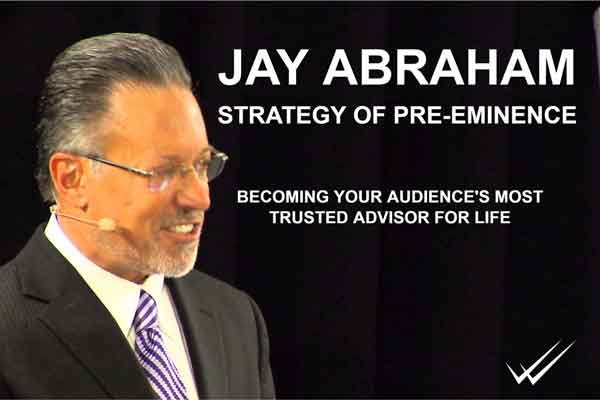
From Jay's own cliff notes, here's a little excerpt that should help understand this strategy...
Strategy of Preeminence
Being Seen as Your Most Trusted Advisor For Life
(and for everyone else in your life who is important to you)Empathy Selling
Leadership
I feel the way you feel.
I truly understand what your problem is.
I am giving advice not information.
I'm telling you here’s what you should be doing about it and here’s how – specific.
I'm prescribing, not selling.
I have your best interests at heart. Even if it costs me monetarily right now.
In a nutshell, there is a small group of companies... a very small minority... that have their clients' best interests at the core of their strategy.
And that philosophical overlook permeates every single aspect of their operations as well as marketing. And that includes warranties and repairs.
How Exceptional Product Quality is Enough To Create An Unassailable Brand
Guarantees and warranties are great.
But what you still do need is an excellent product. And often, the excellence of your product alone is sufficient to help create an unassailable brand.

Now, if you're excellent, and your competitors are excellent, then your USP is not likely to be the excellence of product quality. Excellent product quality is a necessary pre-requisite to creating a great brand.
But if your competitors offer lackluster products... and if your product simply blows them out of the water... then what you have is a brand that can be built on the back of product quality alone.
Newly launched iPhones just blew every other smartphone out of the water. Those were mindblowing. Every other competitor offered some or most of the features that the iPhone offered. But none offered all those features with all that simplicity. And a display big enough that suddenly grandmas were using iPhones... The smartphone was no longer limited to just executives or teenagers with rich dads.
Levi's is another such brand. Everytime I buy a pair of jeans from some other company, I regret it within a week. But Levi's is something else. They have good comfortable fabric, and the fit is amazing.
How You Can Outdo Your Competitors Through Just A Unique Payment Plan
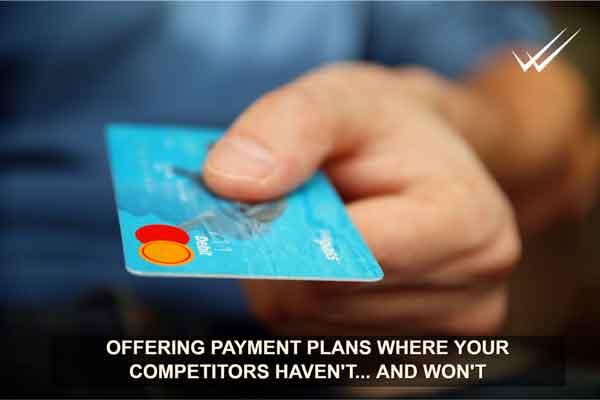
Heard of a computer company that lets you pay a small monthly payment for as many as 36 months when you buy a computer today? Dell.
Of course Dell's not just famous for their unique payment plan. But I distinctly remember having bought a Dell laptop many, many years ago simply because they let me use my credit.
If you're doing things right... then you're not fighting the "lowest price" war. Which means chances are that you've priced your product at a premium value. And offering a payment plan might just be the little extra push it takes for your audience to become receptive customers.
Now, each of these six ways of making a unique offering are powerful by themselves. But put them together, and you've got a juggernaut.

In the next part of this article, we'll look at the second cornerstone of strategy formulation... Economics.
Selling is largely a symphony of psychology and mathematics, and while unique positioning takes care of psychology, nothing works until the math works.
